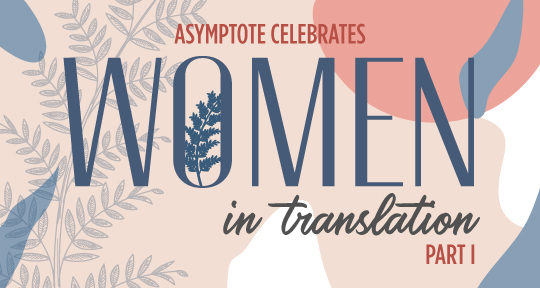Magda Cârneci is a luminary. Writing in the vein of what Beauvoir called the artist’s need to “will freedom in [themselves] and universally,” her novel FEM is a feat of feminine imagination, at once within and beyond the body. Structured in a fluid prose but intricate with poetry’s capacities to manifest the numinous, the resulting text is an immensely powerful excursion within the mysteries of the mind as it meets the mysteries of the universe. We are proud to feature FEM as our Book Club selection for the month of June, and also to speak to Cârneci alongside translater Sean Cotter in a live interview held for members. The conversation, transcribed below, touches on the intricacies of contemporary Romanian literature, the legacy of French feminism, and the transcendental experiences of everyday life.
The Asymptote Book Club aspires to bring the best in translated fiction every month to readers around the world. You can sign up to receive next month’s selection on our website for as little as USD15 per book; once you’re a member, join our Facebook group for exclusive Book Club discussions and receive invitations to our members-only Zoom Q&As with the author or the translator of each title!
Andreea Iulia Scridon (AIS): Magda—you’re probably best known as a poet, but could you tell us about your history of writing fiction—or should I say prose? Did this represent a transition; were there anxieties about this process, or did it come naturally to you?
Magda Cârneci (MC): I used to write poetry, but at a certain moment, I realized that poetry is less read than prose, and the audience, unfortunately, is less numerous than it is for fiction. And as I had a message to transmit and some obsessions to confess, I felt the need to use fiction—the narrative as a tool, as a literary tool. It’s true that the prose form gives you possibilities which do not exist in poetry: describing and analysing feelings, or perceptions, or sensations in a minute way. So from this point of view, prose writing was a marvelous discovery for me. But I have to say that I mingle prose and poetry; I use poetry a lot in my writing, because I think it is a way of charging words with an intensity and with an aura of feelings. That does not exist in normal prose writing. So this is a kind of poetic prose or visionary prose, what I do in FEM.
AIS: Sean wrote a very interesting study called Literary Translation and the Idea of a Minor Romania, which I recommend to anybody interested in comparative literature, actually. So Sean, I was wondering if you could tell us what you think Romanian literature in particular is defined by, insomuch as it as possible to define a literature briefly, and what it brings to the corpus of world literature or global literature in particular.
Sean Cotter (SC): I don’t think that there’s an essence that would unite all Romanian literature in a useful way; what I would recommend is a difference in perspective when it comes to reading Romanian literature or understanding its history as a whole. This is something I addressed in the book—that in contrast to our usual ways of looking at national literatures (especially literature in the United States), I think we have to pay much more attention, when reading Romanian literature, to its interactions with other literatures. I think it’s much easier to misunderstand what is happening and why things changed, or why new things develop within Romanian literature, if we don’t attempt to document such interactions—and I think that FEM is a great example of this. READ MORE…



